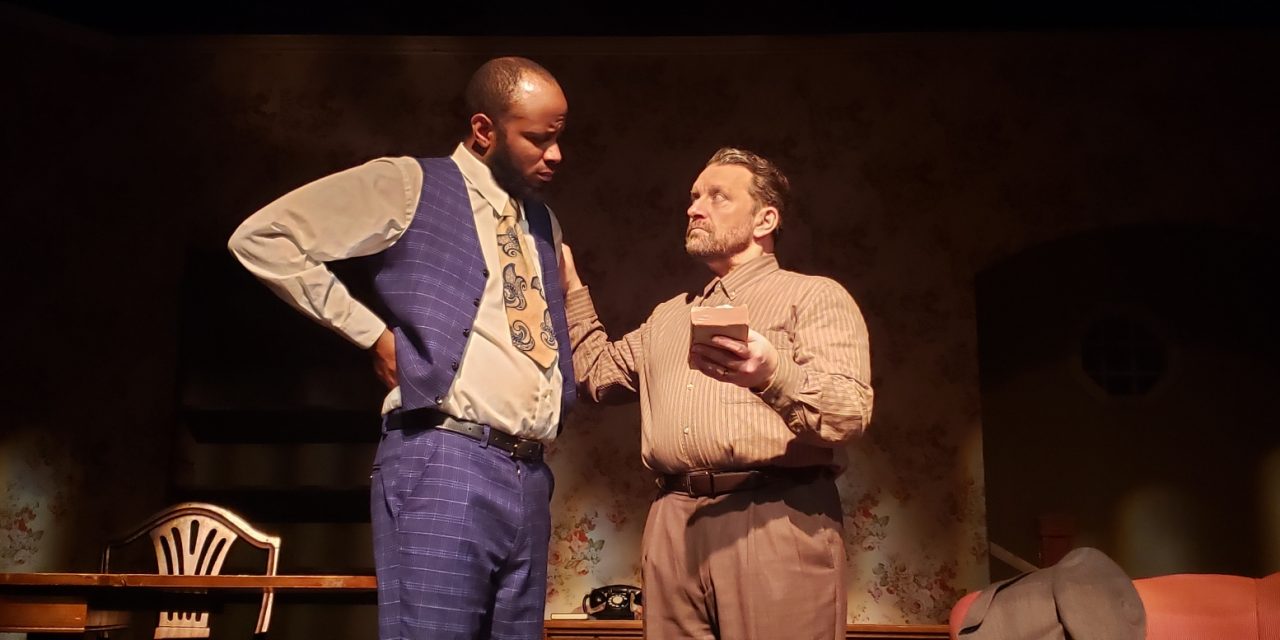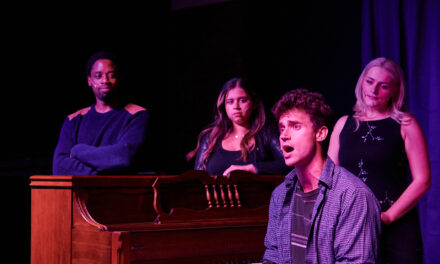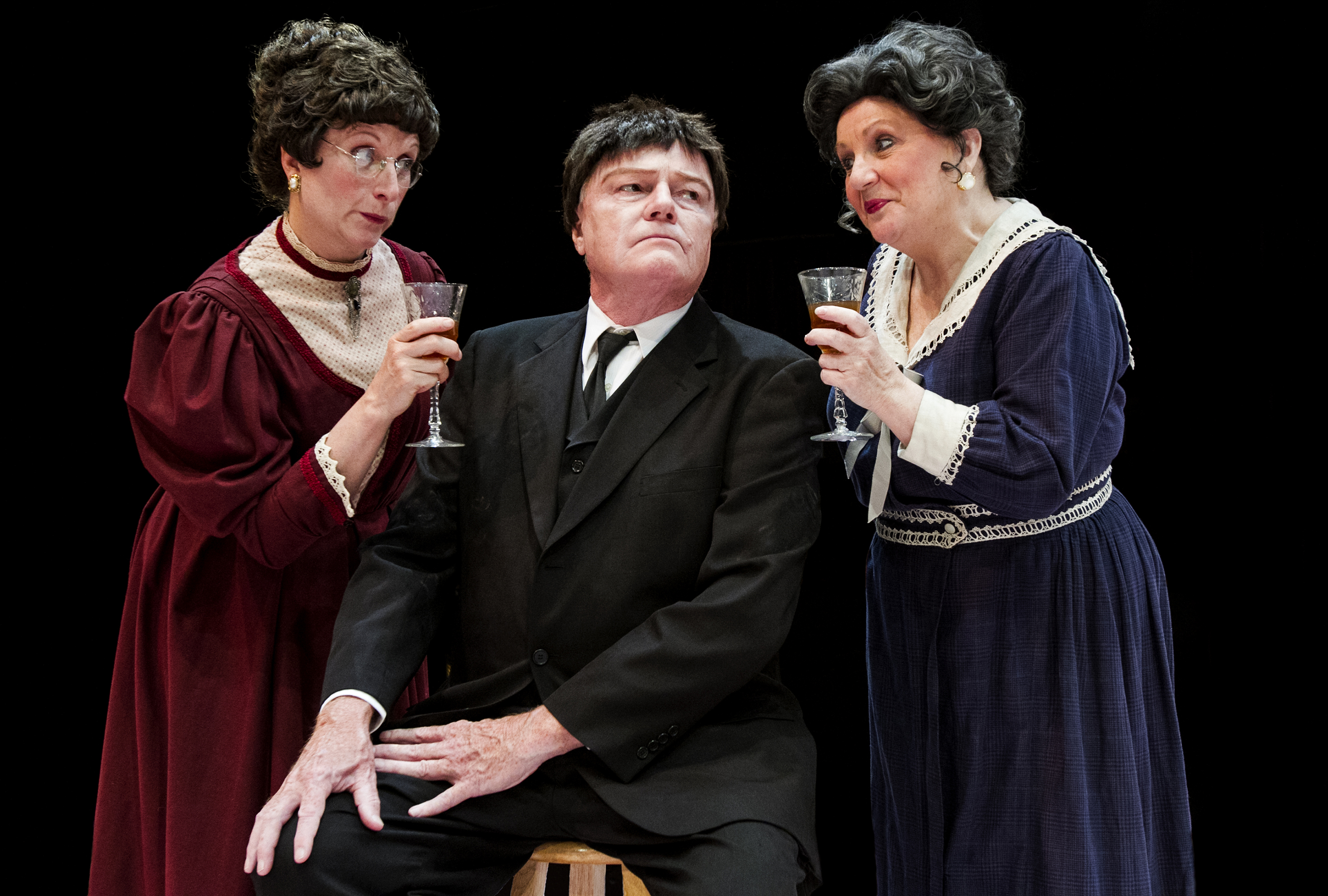Tyler Madden & Karl Seitz in The Green Book. Photo: Bunbury Theatre
The Green Book
By Calvin A. Ramsey
Directed by David Y. Chack & Karen Edwards-Hunter
Review by Keith Waits
Entire contents are copyright © 2019, by Keith Waits. All rights reserved.
No, it’s not the movie. Nor is it the basis of the movie. But if the movie prompts you to check out this play, then everybody wins.
The Green Book, or more accurately, The Negro Motorist Green Book, was a travel guide for African-Americans published from 1936 to 1967. It listed restaurants, gas stations, hotels, and private residents that were safe havens for Black travelers all across the country.
Calvin A. Ramsey’s story takes place in St. Joseph, Missouri in the 1950’s, in the home of Barbara (Marquita Howerton), Dan (Joe Monroe), and their daughter Nina (Brittany Patillo). Their house is listed in the Green Book, and they are hosting an Army Captain (Louis Robert Thompson) and his wife (Tia Aday), as well as Keith (Tyler Madden), who works for Green Book publisher Victor Hugo Green selling advertising.
As the guests depart, a pending visit by W.E.B. Dubois has everyone but Keith excited. His idea of change for Black Americans is less high-minded than Dubois, and he has a self-righteous fervor for social climbing through monetary gain and embraces segregation as a tool for economic development.
That problematic attitude will be most assuredly challenged by Jacob (Karl Seitz), a Jewish Holocaust survivor who arrives, Green Book in hand, to seek lodging.
The early scenes in Ramsey’s script at times come off more as an educational polemic than meaningful drama; there is a lot to set up about the characters and the Green Book – how many of us had heard of it before 2018? – And the expository requirements feel a bit awkwardly realized. But he also builds his conflicts with enough care to engage the audience.
At first, the emphasis given to Jacob’s Jewish identity felt like a dangerous detour from the topic, dangerous in that The Green Book runs the risk of becoming yet another narrative of the Black experience seen through the lens of a Liberal white character; they are ubiquitous in the cultural landscape of the past few generations.
But I think Ramsey creates an interesting juxtaposition between the two histories of people oppressed and enslaved by governments and economic systems and the emotional depth and power of the central scenes in which Jacob expands Keith’s understanding of the world of suffering are memorable. Keith has become disconnected from his heritage, just as Jacob had been, and how he came to rediscover his faith and spiritual identity are where the play illustrates the crucial relationship between African American and Jewish American culture.
Karl Seitz is so true and resonant as Jacob, that he holds the very heart of the play in his hands. Still, and imbued with a distinct emotionalism balanced on a razor’s edge. Tyler Madden’s shallow salesman’s posturing is a smart contrast, his cocksure attitude and self-conscious use of his hands revealing the hollow lie of this self-made man. In the preview performance, the cast overall was on target, even while they ironed out the last few wrinkles, but I was also struck once again by Joe Monroe, who has a big man’s confidence in holding the stage by physical presence alone, and that less is more when you have that quality. Nina’s tender age positions her as the crux of the message – the future generation who will come of age in step with the American Civil Rights Movement. Brittany Patilo plays the obvious humor and teenage infatuation with Keith well enough, but she also shows us that Nina will be a Freedom Rider, march on Washington in 1963, and cross the Edmund Pettus Bridge in Selma in 1965.
The lack of subtlety in covering the details of the Negro Motorists Green Book returns in the form of historical images and period songs that, especially together, hammer home the theme and message in an obvious fashion that betrays a lack of trust in the text’s ability to communicates that intention. This sort of temptation to indulge in overemphatic social justice tropes is not uncommon, but courts mawkishness. Perhaps the times demand it, but for me, I felt satisfied that the text and the actor’s performances did the job quite well, and prompt a more thoughtful response that allows us to examine our own behavior and rationalizations for how we choose to live. It’s allowing the audience to make the last few steps in the journey within their own heart and mind that defines great art and makes the lesson all the more powerful.
I think The Green Book overcomes many such objections by actually reversing the dynamic and presenting its one non-African American character through the eyes of the characters of color. It also gives Jacob enough spiritual sanctity that we might see him as a reversal of another annoying trope common throughout the history of Hollywood, the Magic Negro: “He’s the old black figure, smiling and happy, imbued with timeless wisdom, who helps the white hero get through some extraordinary challenge.”
Jacob is allowed more dimension than that, but he functions in much the same way. His presence changes the world for this family, and, more profoundly, Keith. But it is important that Ramsey finally recognizes the duplicity and brutal violence that most identifies the strangulation of Jim Crow America and the Civil Rights struggle that would finally defeat it (?), for this was a time when such change required a blood sacrifice to finally be realized. The question of whether we are once again in such a time is one of the things that make this Green Book worth a visit.
The Green Book
February 8 (preview), 9, 14, 15, 16, 21, 22, 23 @ 7:30pm
February 10, 17, 24 @ 2:00pm
Talkback Schedule and affiliations
Feb 9th: Fred Gross, Author of “One Step Ahead of Hitler: A Jewish Child’s Journey Through France”, Ytasha Womack, Chicago-based Afro-Futurist filmmaker, and author of Afro-Futurism: The World of Black Sci-Fi and Fantasy Culture
Feb 10th: Sadiqa Reynolds, President, and CEO of the Louisville Urban League
Morris Weiss, at Kentucky One and formerly Jewish Hospital, who is also a champion of civil rights and a spokesman for world peace
Fred Whittaker, a notable Holocaust educator in Louisville, who recently visited Poland and the death camps there
Ytasha Womack, Chicago-based Afro-Futurist filmmaker, and author of Afro-Futurism: The World of Black Sci-Fi and Fantasy Culture
Feb 15th: Janna Segal, Assistant Professor, Director of Graduate Studies at University of Louisville, Nefertiti Burton, Professor and Chair, Department of Theatre Arts Howard University, Washington, D.C
Feb 17th: Baron Kelly, Theatre Professor, Head of Acting at University of Louisville , Abby Glogower, Curator at The Filson Historical Society
Feb 21st: Abby Glogower, Curator at The Filson Historical Society
Feb 23rd: Aukram Burton, Executive Director of the Kentucky Center for African American Heritage
Bunbury Theatre Company and ShPIeL Performing Identity
The Henry Clay Theatre
604 South Third Street
Louisville, KY, 40202
Bunburytheatre.org
Keith Waits is a native of Louisville who works at Louisville Visual Art during the days, including being the host of LVA’s Artebella On The Radio on WXOX 97.1 FM / ARTxFM.com, but spends most of his evenings indulging his taste for theatre, music and visual arts. His work has appeared in Pure Uncut Candy, TheatreLouisville, and Louisville Mojo. He is now Managing Editor for Arts-Louisville.com.
2019 Arts-Louisville/Broadway World Theatre Award Sponsorship provided by






